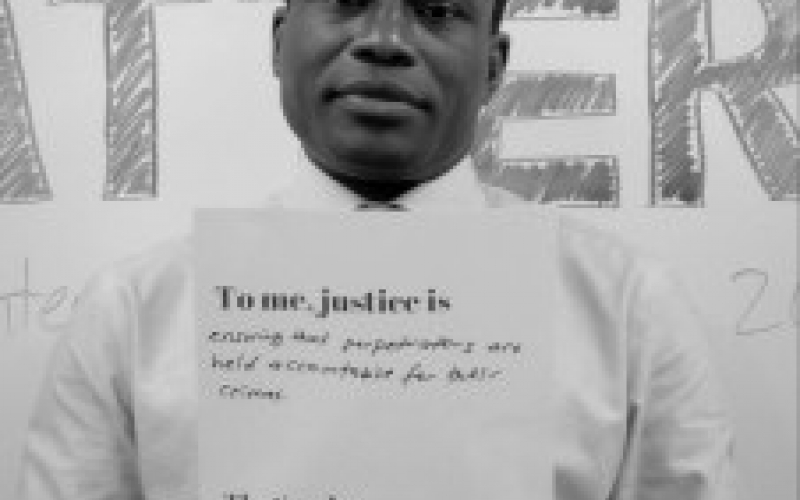#GlobalJusticeWeekly - Time to make international justice work

"On the anniversary of the adoption of the ICC Rome Statute, all states—those party to the treaty and others—should renew commitments to cooperate with this historic and still new system of international criminal justice through all available avenues, from national laws to transnational agreements," said William R. Pace, convenor of the Coalition for the ICC.
Read more from civil society in Ukraine, Israel, Mexico and Iran...
Global civil society marks International Justice Day
On this day in Rome in 1998, world governments agreed an unprecedented global framework to punish individuals for war crimes, crimes against humanity and genocide.
The adoption of the Rome Statute led to the establishment of the International Criminal Court four years later.
With grave crimes continuing to be committed with impunity around the world, it is clear that #JusticeMatters more than ever.
Find out how global civil society is marking the day.
You can still tell the world why #JusticeMatters to you this International Justice Day!
Central African Republic
Geraldine Mattioli-Zeltner of Human Rights Watch (HRW) argued that the special court for the CAR has the potential to become a new model of justice for grave international crimes. A group of human rights organizations said that the CAR conflict left about 2,000 missing.
Kenya
Judges will rule on ICC Prosecutor Fatou Bensouda’s request to use prior recorded witness statements in the case against Kenyan Deputy President William Ruto in August. Bensouda said that she will not appear in a Kenyan court to participate in a case dealing with the Waki report. In its new strategic plan, the prosecutor admitted to mistakes in the Kenya investigation.
A columnist writing for the Standard argued that the question of whether Kenya should leave the ICC deserves national attention and possibly a popular referendum.
Darfur
The South African government filed leave to appeal a court ruling that it should have detained Sudanese President Omar Al-Bashir, arguing that the decision was based on a flawed interpretation of South Africa’s Rome Statute implementation law. The Sudanese government said that the UN secretary-general denied asking South Africa to arrest Al-Bashir.
Tribal clashes in South Darfur left over 170 dead.
Democratic Republic of Congo
HRW called on the Congolese authorities and UN peacekeepers to take urgent steps to arrest militia leader Sylvestre Mudacumura, who is wanted by the ICC for war crimes.
The review of the Thomas Lubanga sentence was postponed until August. Lubanga’s lawyers want the presiding judge, ICC President Silvia Fernández de Gurmendi, removed from a review of his sentence. Academic Kevin Jon Heller argued that Judge Fernandez should be disqualified from the review.
The UN dropped its demand that the Congolese government replace two generals accused of human right abuses before peacekeepers resume cooperation with the DRC army.
Libya
The majority of Libyan parties signed the UN-brokered peace accord, but the legally installed government in Tripoli refused. A UN envoy urged the Tripoli government to sign accord.
Mali
Police in Mali arrested 20 suspected Islamist militants.
Uganda
Former Lord's Resistance Army abductees say that the stigma attached to them hinders their recovery.
Preliminary Examinations
Colombia pledged to de-escalate actions against the FARC if they rebels abide by their one-month ceasefire, and the Colombian president replaced several military commanders in an effort to steady peace talks. Professor Louise Mallinder discussed the need to balance negotiating a peaceful transition and the need for accountability in Colombia.
A Georgian envoy called Russia’s border marking activity in South Ossetia a provocation, but Georgia’s prime minister said that there is no need to panic.
Guinea’s former military leader denied involvement in the 2009 Conakry stadium massacre.
Nigeria’s president replaced his top military chiefs in an effort to boost the fight against the Boko Haram. HRW called on the new military chiefs to prioritize human rights and accountability.
Palestine formed a committee to investigate crimes allegedly committed by Israel during the 2014 Gaza conflict. In a Haaretz column, M. Cherif Bassiouni argued that Israel and Palestine should hold a joint truth commission. Judges requested that ICC prosecutor to reconsider the decision not to open an investigation into the 2010 raid on a Gaza-bound humanitarian flotilla.
Campaign for Global Justice
The president of the Malaysian Bar called the Malaysian government’s apparent refusal to join the Court a ‘worrying ‘u-turn.’’ FOHRID called on Nepal to join the ICC.
What else is happening?
HRW warned that Kurdish groups in Syria are not meeting their commitments to demobilize their child soldiers.
Physicians for Human Rights called for the US to investigate the American Psychological Association’s role in alleged US torture.
In a letter to US Secretary of State John Kerry, HRW praised outgoing Ambassador-at-Large for War Crimes Stephen Rapp.
At a seminar in Costa Rica, Central American states reaffirmed their commitments to the ICC.
Malaysia asked the UN to set up an international tribunal to prosecute those responsible for downing flight MH17 in Ukraine. The UN reported that widespread human rights violations are being committed by all parties in Iraq.
Want to receive news like this in your inbox? Sign up here for weekly mail updates.
